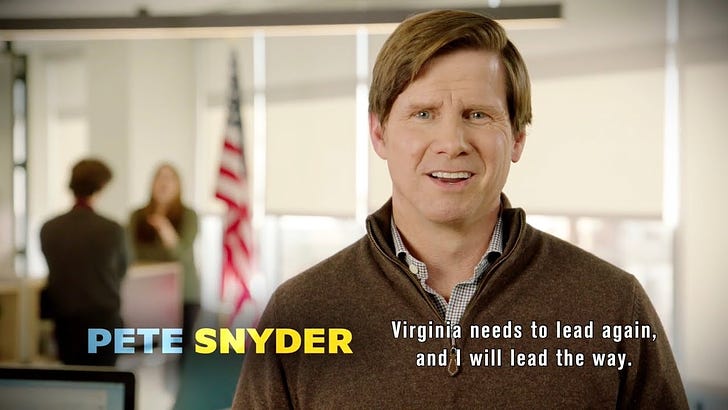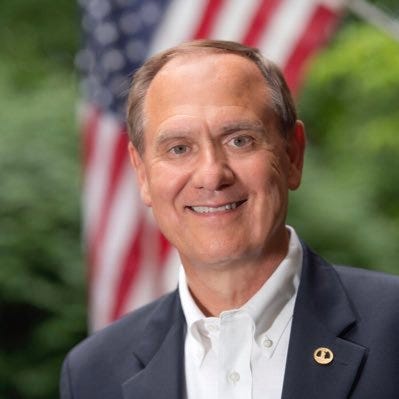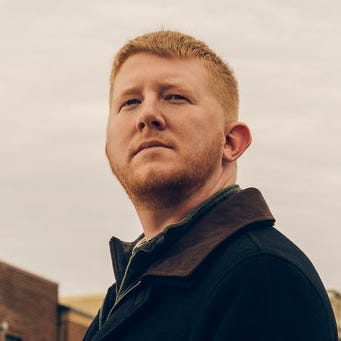Republicans are moving forward with organizing a convention – but the Chairman warns action must be taken
Here are the top stories in Virginia politics today.
Here are the latest news stories in Virginia politics!
Pete Snyder is running for Governor
The marketing executive and CEO of Disruptor Capital is seeking the Republican nomination to run for Governor of Virginia.
Senator Amanda Chase (Chesterfield), Delegate Kirk Cox (Colonial Heights), and Sergio De la Peña are also seeking the nomination.
Snyder’s campaign video below:
Snyder’s website shows that he wants to “Open Our Schools, Save Small Business, Restore and Respect Our Freedoms.”
Republicans are moving forward with organizing a convention – but the Chairman warns action must be taken
Republican Party of Virginia Chairman Rich Anderson sent a letter on Monday to Republican State Central Committee members updating them on where the nomination process stands while also warning that an inability to reach a final decision will result in the committee members choosing the nominees themselves.
“Without approved State Party Plan (SPP) amendments for an unassembled convention, we are now on a trajectory that will preclude an assembled convention, an unassembled convention, and a primary,” Anderson wrote in the letter. “That will require that our three statewide nominees be selected by the State Central Committee (SCC), which will take on the perception of party bosses huddled in a smoke-filled back room.
In case you missed it, the committee met for a third time on Saturday to finalize the nomination process for statewide candidates. The committee originally voted for a convention with the vague-understanding that it would be amended to become an unassembled, drive-thru process.
The Dec. 5 vote was close and contentious. The next two meetings where members attempted to reconsider the nomination methods were just as tense with the motion to reconsider a primary failing each time. The motion to amend the plan and change it to an unassembled convention also failed each time, leaving the committee with the original option of a traditional convention, which is hard to imagine under current protocols in Virginia.
Anderson told committee members that he acknowledges the required 75% agreement among committee members to amend the plan from a traditional convention to an unassembled one does not look promising.
“As most have acknowledged, the current COVID-19 restrictions in Virginia preclude an assembled convention, and a majority of SCC members (but not the required 75% threshold) want to approve amendments to the SPP for an unassembled drive-through convention,” wrote Anderson. “At present, this is unachievable and not likely forthcoming. That is the current situation in which we find ourselves, and we now stand at an impasse with no apparent way forward.”
Also acknowledging the time being wasted on arguing over the process, Anderson said he has to move forward with planning.
“As State Party Chair, I now find myself at a place where I have been instructed by the SCC through four successive votes—across three meetings and over a two-month period—that we will proceed with a convention,” he wrote. “From my perspective, the clock is ticking, time is fleeing, the media has been reporting since December 5th that we have opted for a convention, and our 126 local Republican units and rank-and-file Republicans have been told four times by an SCC majority that we are moving with a convention. Likewise, many of our candidates for all three statewide offices have been proceeding since December 5th with engineering their campaigns for a convention.”
Anderson said the party plan requires that he now forms convention committees and move the process forward in that direction.
“In the interim and in the coming week, I have no choice but to form the various convention committees that are mandated by the SPP for convention planning, which is consistent with what I have previously said to the SCC,” Anderson wrote in the letter. “With our present impasse, I will direct the RPV staff to initiate contingency planning for both convention options (i.e., assembled and unassembled conventions). While I prefer to plan for an unassembled convention only, I do not have that option and would be negligent if I were to defer planning to a future date.”
In wrapping up the letter to committee members, Anderson stressed that he believes the trajectory of the process will make it hard for any of the nomination methods to take place, leaving it up to the State Central Committee members to decide the Republican candidate, something he hopes does not happen.
“To the best of my knowledge, the last statewide nominee designated by the SCC was in 1978 under extraordinary circumstances when Senator John W. Warner III was selected after the death of our convention-nominated candidate, Richard D. Obenshain. Four decades later, I don’t wish to employ this method.”
The committee is scheduled to meet again on February 27. Anderson wrote he believes the members the time after emotions have been high over the process. “I believe that we now need a cooling-off period as a result of our present impasse, passions running at elevated levels in full view of the public, adverse publicity, and the need for Congressional District Republican Committee chairs to research potential district venues for unassembled conventions,” wrote Anderson.
Candidates say that judge agrees to deal
In an update to our story from yesterday, Lieutenant Governor candidate Paul Goldman (D) and Lee Carter (D) say that a judge agreed to a deal on reducing the number of signatures required for statewide candidates. Goldman and Carter say that the agreement is to drop the overall number of signatures required from 10,000 to 2,000, with only 50 signatures required from each congressional district. In addition, they have come to an agreement to allow people to turn in electronic signatures.
According to Goldman, the written order should be released this week.
More News:
Gilbert calls out Democrats for skipping public speakers in virtual meetings
The House Republican Leader, Del. Todd Gilbert (Shenandoah) issued a statement on Monday criticizing House Democrats after members of the public were not able to speak in a House Education subcommittee meeting.
“Parents have every right to be upset. They came to the ‘virtual’ session in good faith, logging on well before the 7 a.m. start time to ensure their place in line,” said Gilbert. “But it appears that Chairman Schuyler VanValkenburg only wanted to hear from people who were in favor of the bill. He allowed extended testimony from supporters, but cut off testimony from opponents after only one witness.”
Chairman of the subcommittee, Delegate Schuyler VanValkenburg (D-Henrico), said it was a mistake that the members of the public were unable to speak at the meeting on Monday morning. “We had a vigorous 45-minute debate on the bill,” VanValkenburg. said. “We did accidentally not call on some people in the back and forth.”
Gilbert said in a statement on Monday that this is why Republicans advocated against a virtual session. “Situations like this are the reason Republicans cautioned against ‘virtual’ sessions in the first place. Had this been a normal session these witnesses would have been seen by the public, had a chance to talk with legislators afterward, or at least get the attention of a Republican member who could plead their case to the Chairman.”
VanValkenburg expressed regret for the mistake and said it will be rectified when the bill comes up in the full committee on Wednesday. “We will make sure they can testify in full committee on Wednesday.”
The Republican Leader still believes that the virtual session is being used to silence opposition in the House. “Virtual sessions make it easy to silence opposition. And that should scare anyone who believes in democracy.”
VanValkenburg disagrees and said that he runs the subcommittee in a way to let both sides speak. “I think all advocates and people in both parties would say I run that subcommittee fairly – ensuring all voices are heard,” said VanValkenburg. “The best proof of that is we spent 20 minutes listening to people criticize my bill.”
The bill passed the Committee with amendments and will be up in the full House Education committee on Wednesday.
LG Candidate Delegate Elizabeth Guzman (D) Calls for Comprehensive Report from the Virginia Department of Health Outlining Problems with Vaccine Administration
Following reports that Virginia ranks 50th in the nation in the efficacy of its vaccine distribution, Delegate Elizabeth Guzman called for a comprehensive report from the Virginia Dept. of Health on Tuesday outlining the challenges facing the Commonwealth with vaccine distribution.
“The fact we do not have enough vaccines is a separate problem from the fact we are not getting the vaccines we do have into arms,” said Delegate Guzman. “Virginia is responsible for ensuring that the vaccines we have been allotted are administered in a timely fashion. We have already seen a dire failure of Spanish-language communication that resulted in the VDH website stating that the vaccine was not necessary. I have also heard anecdotal reports that essential workers are not showing up to their appointments because they cannot get paid time off to receive the vaccine and, if necessary, recover from its side effects. I do not understand how my 78-year-old mother is still on a waitlist to get her vaccine, so I know countless families must be experiencing the same frustration. We need answers from the Virginia Dept. of Health so that we as legislators can determine what type of support is needed based on the challenges that the individual health districts face.”
Terry McAuliffe today announced a Plan of Action for a Fairer Commonwealth to reform Virginia’s criminal justice system during a conversation with key Virginia criminal justice advocates.
"I tried to do everything I could do as governor to make sure that Virginia was treating everybody with dignity and respect,” said McAuliffe. “And that’s what this plan that I’ve just laid out does...We’ve made progress, but we have a long long way to go. And we need to continue to lean in with big, bold ideas to take Virginia forward and really correct a lot of the wrongs of the past, and the many members of the Black and Brown communities who have disproportionately been affected.”
The Virginia Senate passed several pieces of legislation on Monday:
SB 1122 Habitual offenders; repeal. - Senator Bill Stanley (R)
Repeals the remaining provisions of the Habitual Offender Act. The bill also requires that the Commissioner of the Department of Motor Vehicles reinstate a person's privilege to drive a motor vehicle that was suspended or revoked solely on the basis that such person was determined to be or adjudicated a habitual offender pursuant to the Habitual Offender Act.
SB 1182 Motor vehicle liability insurance; increases coverage amounts. - Senator Scott Surovell (D)
Increases the motor vehicle liability insurance coverage amounts from $25,000 to $50,000 in cases of bodily injury to or death of one person, from $50,000 to $100,000 in cases of bodily injury to or death of more than one person in any one accident, and from $20,000 to $40,000 for damage to property of others as a result of any one accident. The bill requires that self-insured operators of taxicabs maintain protection against uninsured and underinsured drivers with the current limits of $25,000, $50,000, and $20,000, respectively. The bill applies to policies issued or renewed on or after January 1, 2022.
SB 1097 Absentee voting; witness signature not required. - Senator Barbara Favola (D)
Repeals the requirement that an absentee ballot be opened in the presence of a witness and signed by such witness.
SB 1194 Produce safety; removes the sunset date. - Senator Mark Obenshain (R)
Removes the sunset date for Chapter 51.1 (§ 3.2-5146 et seq.) of Title 3.2 on produce safety, which was enacted in 2017 and set to expire upon the effective date of the repeal of certain federal regulations or on July 1, 2022, whichever occurs sooner. The chapter will still expire upon the effective date of the repeal of such federal regulations that require the provisions of Chapter 51.1 to exist.
SB 1239 Absentee voting; third-party absentee ballot assembly and distribution. - Senator John Bell (D)
Permits a general registrar to contract with a third party for the printing, assembly, and mailing of absentee ballots. The bill directs the State Board of Elections to adopt emergency regulations to implement the provisions of the bill and for those regulations to include processes to ensure secure and timely delivery of voter information to contractors and reports of mailed absentee ballots from contractors.
SB 1274 Wildlife corridors; various agencies to consider and incorporate. - Senator Dave Marsden (D)
Directs various agencies to consider and incorporate, where applicable, wildlife corridors and any recommendation of the Wildlife Corridor Action Plan. The bill directs the Department of Wildlife Resources to assist state agencies and political subdivisions, and by request any federal agency, in considering and incorporating, where applicable, wildlife corridors and the recommendations of the Plan when developing any governmental strategic plan, map, or action.
SB 1281 General registrar; qualifications, residency. - Senator Joe Morrissey (D)
Removes the requirement that the general registrar of a locality be a resident of that locality or an adjacent locality.
SB 1290 ConserveVirginia program; established. - Senator Monty Mason (D)
Establishes in the Department of Conservation and Recreation a data-driven Geographical Information Systems model to prioritize potential conservation areas across the Commonwealth that would provide quantifiable benefits to the citizens of Virginia, known as ConserveVirginia. Aspects of the program include (i) the synthesis of multiple mapped data inputs, divided into categories, each representing a different overarching conservation value, and periodic revision of such values; (ii) access to the model by the public and all state and federal agencies; and (iii) incorporation of the model into acquisition or grant decisions when appropriate. The bill requires the Virginia Land Conservation Foundation to report on the success of the program and incorporate the program into needs assessments for expenditures from the Virginia Land Conservation Fund.





